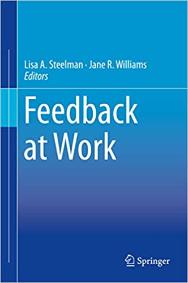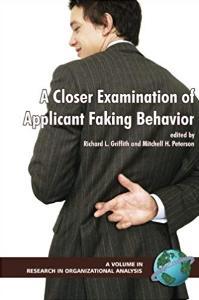Check-out the latest books written and edited by School of Psychology faculty.
| Publication | Author | Publication Date | Description |
|---|---|---|---|
 |
Steelman, Lisa and Williams, Jane | 2019 |
Feedback at Work delivers an evidence-based summary of best practices in providing and utilizing feedback in organizational settings. Bringing together a range of renowned experts, the chapters in this book discuss the current state of feedback theory and research, as well as practical recommendations for using the evidence to improve feedback processes in organizations. This book is intended for scholars and managers, but anyone on the giving or receiving end of feedback will benefit from a better understanding of the process. The chapters in this volume take the reader deep into the current literature, set a research agenda for the future, and provide key take-aways to enhance intentionality in the feedback process. |
 |
Webbe, Frank | 2010 |
From the Foreword to the Handbook of Sports Neuropsychology by Dr. Frank Webbe Dr. Webbe uses his vast knowledge and experience in the field of sport neuropsychology to create a superb road map that provides important information and direction for the study of sports concussion. This handbook reflects his skill at attracting some of the world’s leaders in sport neuropsychology as chapter authors, and his ability to organize and integrate their unique funds of knowledge. I am pleased to have been asked to contribute to this important addition to the literature, and I hope you will join me in experiencing Dr. Webbe’s passion and optimism regarding the future of sport neuropsychology, which is reflected in this extraordinary gift to our field.
|
 |
Krishnamurthy, Radhika | 2018 |
Diversity-Sensitive Personality Assessment is a comprehensive guide for clinicians to consider how various aspects of client diversity―ethnicity, gender, sexual orientation, age, nationality, religion, regionalism, socioeconomic status, and disability status―can impact assessment results, interpretation, and feedback. Chapters co-written by leading experts in the fields of diversity and personality assessment examine the influence of clinician, client, interpersonal, and professional factors within the assessment context. This richly informed and clinically useful volume encourages clinicians to delve into the complex ways in which individuals’ personal characteristics, backgrounds, and viewpoints intersect. This book fills an important gap in the personality assessment literature and is an essential resource for clinicians looking to move beyond surface-level understandings of diversity in assessment. |
 |
Kenkel, Mary Beth | 2009 |
Over half of the clinical psychologists graduating each year come from professionally oriented doctoral programs in psychology. Therefore, the impact of the type of training those students receive is tremendous. This book presents the research-based model for education in professional psychology. |
 |
Griffith, Rich and Peterson, Mitch | 2006 |
The faking of personality tests in a selection context has been perceived as somewhat of a nuisance variable, and largely ignored, or glossed over by the academic literature. Instead of examining the phenomenon many researchers have ignored its existence, or trivialized the impact of faking on personality measurement. The present volume is a much needed, timely corrective to this attitude. In a wide range of chapters representing different philosophical and empirical approaches, the assembled authors demonstrate the courage to tackle this important and difficult topic head-on, as it deserves to be. The writers of these chapters identify two critical concerns with faking. First, if people fake their responses to personality tests, the resulting scores and the inferences drawn from them might become invalid. For example, people who fake their responses by describing themselves as diligent and prompt might earn better conscientiousness scores, and therefore be hired for jobs requiring this trait that in fact they might not perform satisfactorily. Second, the dishonesty of the faker might itself be a problem, separate from its effect on a particular score. Someone who lies on a pre-employment test might also lie about the hours he or she works, or how much cash is in the till at the end of the shift. |
 |
Wildman, J..L. | 2014 |
This breakthrough volume details the psychological and interpersonal skills needed to meet the practical challenges of building, developing, adapting, training, and managing multicultural global teams. Its self-regulation approach offers cognitive keys to understanding and embracing difference and its associated complexities for successful global collaborations and lasting results. From this foundation, the book moves on to the various roles of leadership in facilitating team process, from establishing trust to defusing conflicts, reducing biases, and using feedback effectively. This synthesis of research and practice effectively blends real-world experience and the science of global team leadership to address the complex issues facing modern organizations. |
 |
Griffith, Richard, Foster-Thomspon, L. &Armon, B. | 2014 |
This book assembles state-of-the-art thinking on the internationalization of the curriculum of training centers in I/O and Work Psychology. The experts contributing chapters share their thoughts on the knowledge and skills that students must master in the 21st century, as well as their research on how we can develop students to be globally perceptive, culturally competent working professionals. Chapters cover a full range of topics such as: the scope of subject matter and content, learning objectives and outcomes, global competencies, co-curricular activities, experiential learning and the tacit curriculum, while curriculum development must stem from the philosophy of each institution, these philosophies may diverge in focus (e.g. science versus practice) and outcomes (e.g. jobs versus mastery). Therefore, the goal of the book is not to prescribe a particular curriculum, but rather to provide insight on possible curriculum elements that may be customized for use by training institutions. |
 |
Gutman, Arthur | 2010 |
The goal of this well known book is to provide methods for understanding major EEO laws, including the Civil Rights Act of 1964, the Equal Pay Act of 1963, and the American with Disabilities Act of 1990. Also included are over 700 cases involving federal case law that focus on issues relating to the terms and conditions of employment. New to this third edition are sections at the end of each chapter on "Implications for Practice." These accessible sections will give organizations and managers practical advice on strategies and guidelines for implementing laws and guidelines. A website of additional case materials, power points, and teaching aids accompany this book. |
 |
2019 |
Over 95% of criminal convictions are by guilty plea. Trials are the rarity, and while much has been written on jury decision making and various parts of the trial process, the field has been largely silent on the practice that is most likely to affect an individual charged with a crime: plea bargaining. A System of Pleas: Social Science's Contributions to the Real Legal System brings together into one resource the burgeoning body of research on plea bargaining. Drawing attention to the fact that convictions today are nearly synonymous with guilty pleas, this contributed volume begins with an overview and history of plea bargaining, with chapters focusing on defendants, defense attorneys and prosecutors and plea bargains; influences on plea decision-making, including race, juvenile justice system involvement, and innocence; and the results of a "system of pleas", such as sentencing disparities and mass incarceration, collateral consequences, and disenfranchisement. A concluding chapter by the volume's editors examines ways to move forward within an entrenched system. An excellent reference tool for furthering both research and practice, A System of Pleas is a must-have for academics and legal professionals interested in the fields of criminal justice, psychology and law, and related disciplines. |
|
 |
2021 |
Written by Dr. Jones, Lt. (Ret) and Deputy Chief (Ret.) Blackledge, Law Enforcement Leadership, Management & Supervision provides a robust mix of theory and practical application for current and aspiring sergeants, lieutenants - and those who aspire to higher command. Jones and Blackledge include best practices, along with illustrative case examples and self-assessments. What's included in this edition?
|

 Give to Florida Tech
Give to Florida Tech 